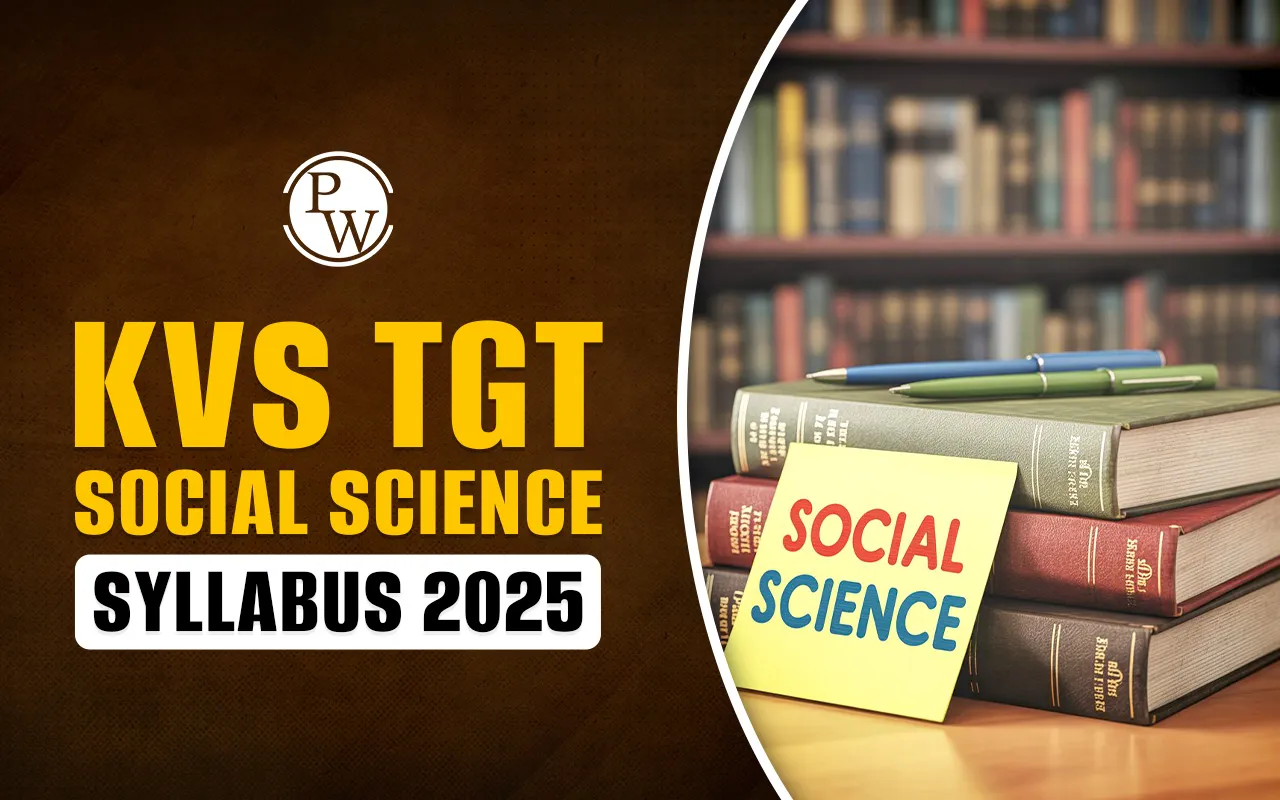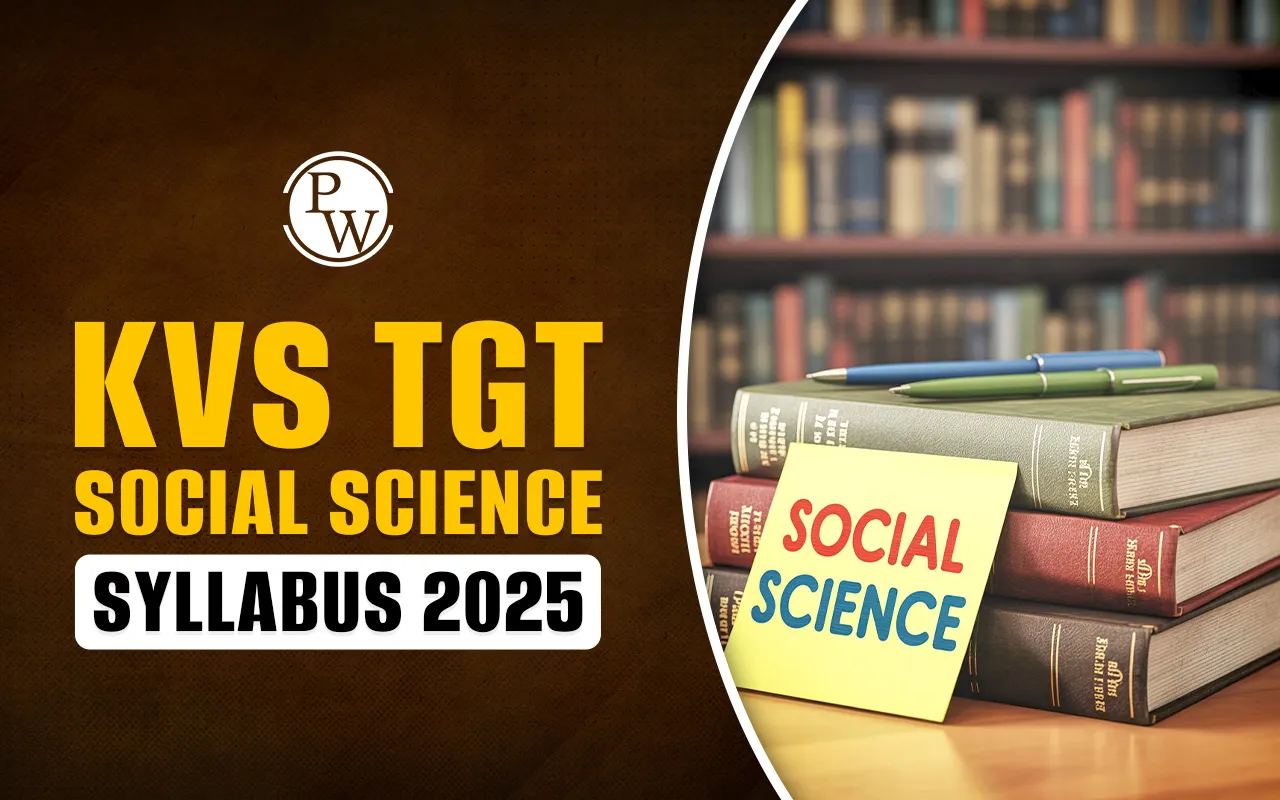

KVS TGT Social Science Syllabus 2025 is an important document for students preparing for the KVS TGT Recruitment 2025 exam. It provides all the details to the candidates on the topics they must study in History, Geography, Civics, and Economics before the exam.
Understanding the KVS TGT Science Syllabus early helps the aspirants plan their preparation in an organised way. A teacher must explain every concept to school children in an easy language. Only then will students be able to learn Social Science confidently.
KVS TGT Social Science Syllabus 2025 Overview
An overview of the KVS TGT Social Science Syllabus 2025 presents the candidates with a quick look at the important topics included in the syllabus. The syllabus covers four key areas:
-
History,
-
Geography,
-
Civics, and
-
Economics.
Each part contains important topics taught in Classes 6 to 10. The KVS TGT Social Science Syllabus helps applicants know what to study first, how much content to revise, and which chapters carry more weight in the exam. It also acts as a roadmap for planning lessons, completing revision, and improving conceptual clarity for classroom teaching.
KVS TGT Social Science Syllabus 2025
KVS TGT Social Science Syllabus 2025 covers topics from History, Geography, Civics, and Economics. These topics are derived primarily from Classes 6 to 10 NCERT books. The syllabus is wide and well-balanced. Below is the detailed explanation of all parts of the syllabus.
History Syllabus
The History part of the KVS TGT Social Science Syllabus 2025 contains four major time periods:
A. Ancient History
-
Indus Valley Civilisation: cities of Harappa, Mohenjo-Daro, and Lothal
-
Town planning and agriculture systems
-
Early art and craft traditions
B. Medieval History
-
Cheras, Cholas, and Pandyas
-
The Sangam Age
-
Administration and culture of South Indian dynasties
-
Vijayanagara Empire: founder, rulers, capital, and governance
C. Modern Indian History
-
Revolt of 1857
-
Decline of Nawabs
-
Reactions of sepoys and peasants
-
How mutiny became a people’s rebellion
D. Themes from Class 9–10 History
-
Forest Society and Colonialism
-
Rise of commercial forestry
-
Pastoralists in the modern world
-
Nationalism in Europe
-
National Movement in India
-
Industrial growth
-
Globalisation and the global world
-
Print culture and modern society
Geography Syllabus
The Geography section in the KVS TGT Social Science Syllabus 2025 includes physical and human geography concepts:
A. Basic Earth Concepts
-
Rotation, revolution, day, night
-
Seasons
-
Latitudes and longitudes
-
Time zones
B. Earth’s Interior
-
Plate tectonics
-
Continental drift
-
Earthquakes and volcanoes
-
Folding and faulting
C. India: Location and Features
-
Size and position
-
Neighbouring countries
-
Himalayas, Northern Plains, Desert, Plateau, Coastal Plains, Islands
D. Drainage Systems
-
Ganga and Brahmaputra river systems
-
Narmada, Tapti, Godavari, Krishna, and Kaveri rivers
-
Lakes
-
Uses of rivers and pollution issues
E. Climate
-
Climatic controls
-
Indian seasons
-
Rainfall patterns
-
Monsoon as a unifying bond
F. Vegetation and Wildlife
-
Evergreen, deciduous, thorny, montane, and mangrove forests
-
Wildlife diversity of India
G. Population
-
Size, density, distribution
-
Growth and processes of change
Civics (Political Science) Syllabus
This part focuses on democracy, government, and institutions.
-
What is democracy?
-
Why is democracy important
-
Making of the Indian Constitution
-
Electoral politics
-
Working of Parliament, Executive, and Judiciary
-
Democratic rights
-
Power sharing (Belgium and Sri Lanka)
-
Federalism
-
Gender, religion, and caste
-
Political parties and their challenges
-
Outcomes of democracy
Economics Syllabus
The Economics part of the KVS TGT Social Science Syllabus 2025 includes:
-
People as a resource
-
Population quality
-
Unemployment
-
Poverty as a challenge
-
Poverty estimates and trends
-
Food security
-
PDS, buffer stocks, and cooperatives
-
Development and its indicators
-
Sectors of the economy
-
Money, credit, and SHGs
-
Globalisation and its impact
-
Consumer rights and protection
KVS TGT Social Science Syllabus PDF 2025 Download
Candidates can download the full KVS TGT Social Science Syllabus 2025 PDF from the official KVS website. The PDF gives exact chapter names and allows students to revise offline without the internet. It is helpful for long-term preparation and quick revision.
| KVS TGT Social Science Syllabus PDF 2025 Download | |
| Official Social Science Syllabus PDF | Download PDF |
KVS TGT Social Science Exam Pattern
The exam pattern explains how the question paper will be structured. Knowing the pattern helps candidates understand the weightage of each section and plan their study routine better.
| KVS TGT Social Science Exam Pattern | ||
| Sections | Subjects | Marks |
| Part I | General English & Hindi | 20 |
| Part II | General Knowledge & Current Affairs | 10 |
| Part III | Reasoning Ability | 10 |
| Part IV | Computer Literacy | 10 |
| Part V | Subject (Social Science) | 100 |
| Total | 150 | |
Marking Scheme
-
Each correct answer carries 1 mark.
-
No negative marking is expected (as per previous years).
-
The total time for the exam is 2 hours and 30 minutes.
KVS TGT Social Science Preparation Tips
To complete the KVS TGT Social Science Syllabus 2025, candidates have to complete all the relevant subjects and topics mentioned in it. Some of the effective KVS TGT Social Science Syllabus Preparation Tips are as follows:
-
Cover all chapters from NCERT Classes 6 to 10.
-
Make short notes for History, Geography, Civics, and Economics.
-
Solve previous papers regularly.
-
Revise basic facts and definitions often.
-
Practice map work for Indian geography.
-
Read the KVS TGT Social Science Syllabus 2025 PDF multiple times to avoid missing any chapter.
